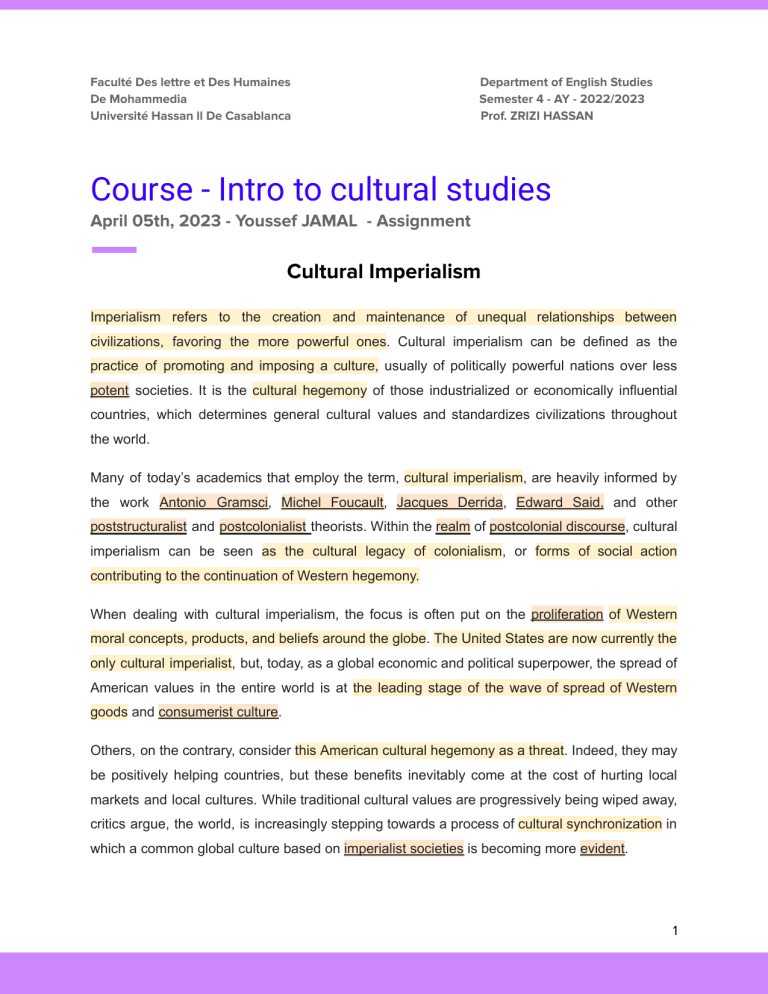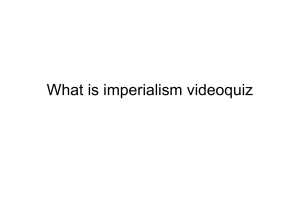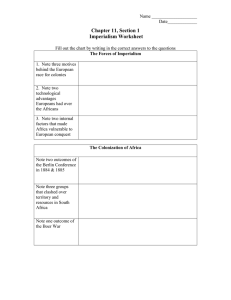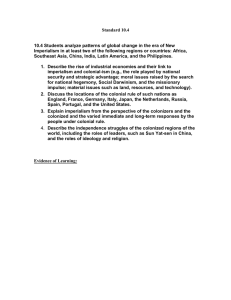
Faculté Des lettre et Des Humaines De Mohammedia Université Hassan ll De Casablanca Department of English Studies Semester 4 - AY - 2022/2023 Prof. ZRIZI HASSAN Course - Intro to cultural studies April 05th, 2023 - Youssef JAMAL - Assignment Cultural Imperialism Imperialism refers to the creation and maintenance of unequal relationships between civilizations, favoring the more powerful ones. Cultural imperialism can be defined as the practice of promoting and imposing a culture, usually of politically powerful nations over less potent societies. It is the cultural hegemony of those industrialized or economically influential countries, which determines general cultural values and standardizes civilizations throughout the world. Many of today’s academics that employ the term, cultural imperialism, are heavily informed by the work Antonio Gramsci, Michel Foucault, Jacques Derrida, Edward Said, and other poststructuralist and postcolonialist theorists. Within the realm of postcolonial discourse, cultural imperialism can be seen as the cultural legacy of colonialism, or forms of social action contributing to the continuation of Western hegemony. When dealing with cultural imperialism, the focus is often put on the proliferation of Western moral concepts, products, and beliefs around the globe. The United States are now currently the only cultural imperialist, but, today, as a global economic and political superpower, the spread of American values in the entire world is at the leading stage of the wave of spread of Western goods and consumerist culture. Others, on the contrary, consider this American cultural hegemony as a threat. Indeed, they may be positively helping countries, but these benefits inevitably come at the cost of hurting local markets and local cultures. While traditional cultural values are progressively being wiped away, critics argue, the world, is increasingly stepping towards a process of cultural synchronization in which a common global culture based on imperialist societies is becoming more evident. 1 This cultural uniformity would predictably lead to the extinction of cultures and make the world less culturally rich and diverse. Of all the areas of the world that scholars have claimed to be adversely affected by imperialism, Africa is probably the most notable. In the expansive « age of imperialism » of the nineteenth century, scholars have argued that European colonization in Africa has led to the elimination of many various cultures, worldviews, and epistemologies. This arguably has led to uneven development, and further informal forms of social control having to do with culture and imperialism. A variety of factors, scholars argue, led to the elimination of cultures, worldviews, and epistemologies, such as « de-linguicization » (replacing native African languages with European ones) and devaluing ontologies that are not explicitly individualistic. One scholar, A. A. Odbi, claims that imperialism inherently « involve(s) extensively interactive regimes and heavy contexts of identity formation, misrecognition, loss of self-esteem, and individual and social doubt in self-efficacy ». Cultural Ethnocentrism Ethnocentrism is the belief that one’s own culture is superior to that of other cultures. It is a form of reductionism that reduces the « other way » of life to a distorted version of one’s own. This is particularly important in case of global dealings when a company or an individual is imbued with the idea that methods, materials, or ideas that worked in the home country, will also work abroad. Environmental differences are, therefore, ignored. Cultural Relativism Different cultural groups think, feel and act differently. There are no scientific standards for considering one group as intrinsically superior or inferior to another. Studying differences in culture among groups and societies presupposes a position of cultural relativism. It does not imply normalcy for oneself, nor for one’s society. It, however, calls for judgment when dealing with groups or societies different from one’s own. Information about the nature of cultural differences between societies, their roots, and their consequences should precede judgment and action. Negotiation is more likely to succeed when the parties concerned understand the reasons for the differences in viewpoints. 2 Discussion: After reading this piece, I would like you to reflect on the following points. 1- What is cultural imperialism? Cultural imperialism refers most widely to an abstract regime imposed by powerful ones on the non-dominant groups in cultural relationships and exercise of domination in which values, traditions, beliefs…etc are taken over by foreign culture and imposed upon native culture out of their will. 2- What are the motivations behind cultural domination? The motivations behind cultural domination are economical and political to drive the market for the proliferation of Western moral concepts, such as consumer behavior, products, and beliefs around the globe. 3- What makes a culture more powerful? The cultural commodity is a very powerful tool in today’s economy that makes culture more powerful. For instance, the language is spoken and the mass production of produced products that are sold worldwide, such as fast food, cars, movies, music, televisions, education, services …etc are the main core for cultural power. The bottom-line dominant groups that weaponized globalization are in favor of culture powerful. 4- How could local cultures promote their originality and difference in relation to foreign ones? I believe here multiculturalism is a very crucial element to promote cultural diversity for both sides without any imperialistic power imposed by a local or foreign culture. For instance, when promoting the originality of local cultures, it is better to reduce our cultural ethnocentrism that disregards foreign ones. For instance, by promoting local culture in relation to foreign ones we should take into consideration four pairs of actions such as "beliefs and behaviors," "recognizes and respects," "acknowledges and values," "encourages and enables," and a fifth one, "empowers." these four pairs of actions are very important when promoting local and foreign cultures. 3 5- Feel free to express your opinion, attitude, criticism concerning any point related to the text. Research Using the dictionary on Cultural studies or any other source, I would like you to write and develop definitions of the following terms related to the text : - Imperialism → Domination of dictatorship by an emperor. - Colonialism → invasion - Ethnocentrism → Being egoistic of your own culture rather than the foreign one. - Orientalism → is the imitation or depiction of aspects in the Eastern world - Hegemony → Leadership & Cultural Domination of democracy - Hybridity → cultural synchronization 4



